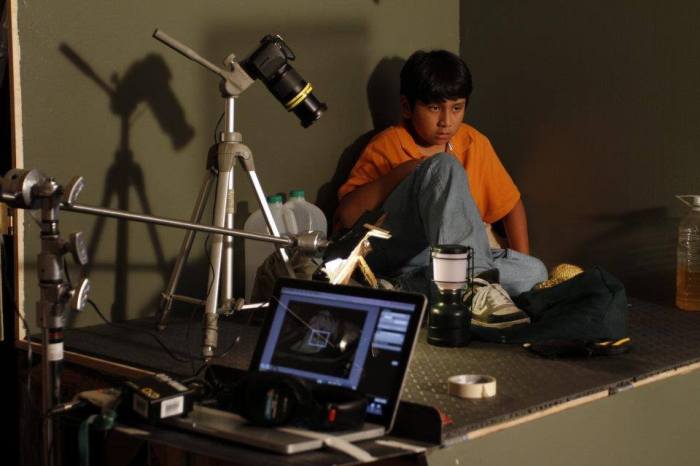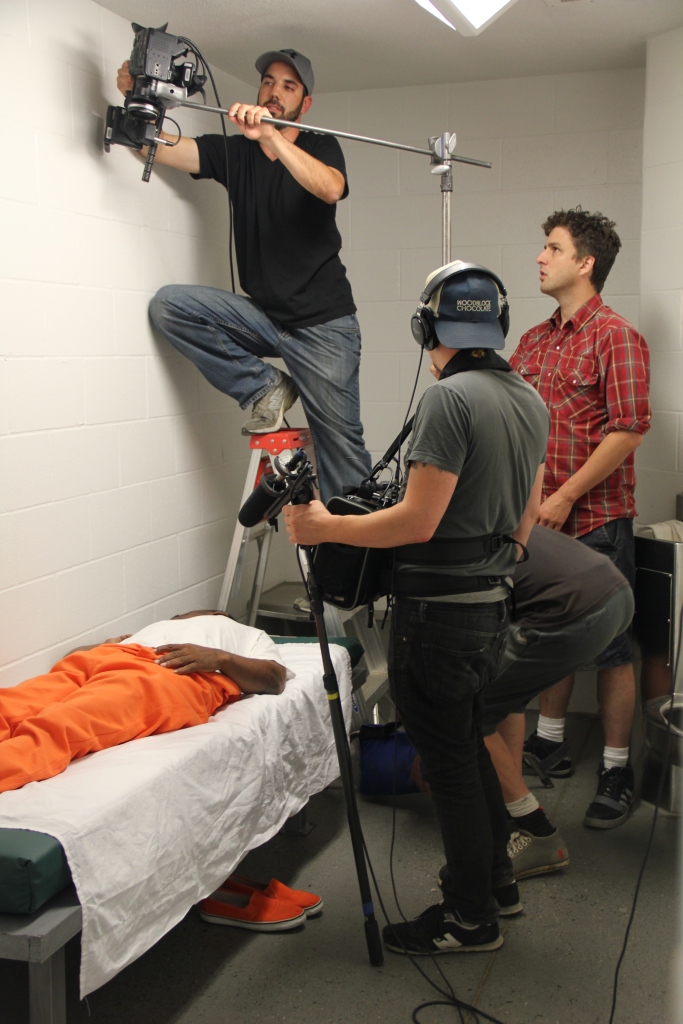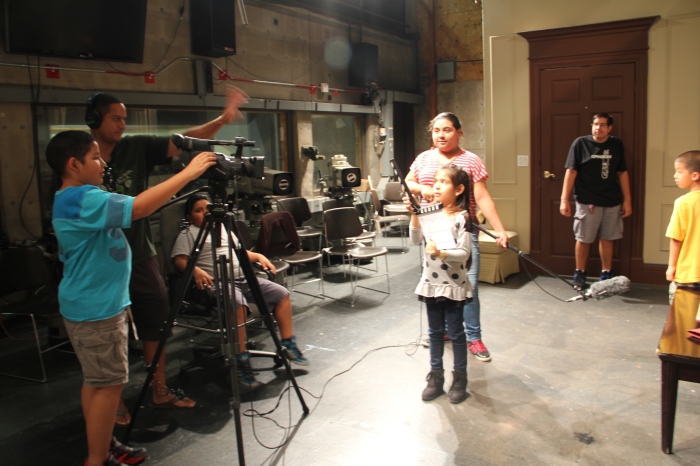Recently, Think Ten Media Group Co-Founder and Indie Film Producer Jennifer Fischer (AKA @IndieJenFischer) was interviewed by Coach Jeanna as part of an entertainment focus she had for her radio show, Ladies Let’s Talk. Then she listened back to the show and culled out some tips for independent filmmakers and shared more insights upon reflection. This post pulls from 10 years of experience as an independent filmmaker, 7 years of experience running a film festival and 5 years of teaching filmmaking classes with kids. What tips would you add to the list?
1. First and foremost — Just do it. Make your first film, and don’t be afraid to fail.

“People get intimidated and think ‘I can’t do it.’ You just need to jump in with both feet and do it. Make your first film. Mess up, make mistakes. It’s fine because you learn. There were a lot of failures for me before there were successes, but all of those failures taught me more…Just start doing it and you will get better. You will improve your craft as you go.”
2. Listen to criticism.
“Don’t be afraid to show your work to people and be open to criticism.” — You don’t know it all. You will become a better filmmaker by showing your work to others, listening to their criticism, meeting others working in film. This will enrich your filmmaking. Having others watch my work (even my bad work) helped me identify what my talents/strengths were as a filmmaker, what roles I needed to bring in others to do and what I needed to learn more about. Not being open to criticism can really hinder your progress.
When I ran the Santa Clarita Valley Film Festival, some filmmakers whose films were not accepted would send nasty emails telling us why we were wrong about their film. Whereas, other filmmakers would request insight into why their film did not get into the festival, which we were happy to share (AFTER our festival was over). At the festival, filmmakers would often ask why they didn’t win an award or what made their film stand out and get accepted. These filmmakers were taking advantage of the festival experience and using it to improve their craft. It was rare, but we did have some filmmakers get accepted in a future year after not being accepted initially. They took the feedback we gave (and probably feedback others gave them) and used it to improve their work with their next film.

Opening Night of the 2010 SCV Film Festival. Think Ten Media Group Co-Founder, Ramon Hamilton (center), with Doug Jones (Actor: Hellboy, Pan’s Labyrinth, Falling Skies, etc.) and Todd Tucker (Writer/Director: Monster Mutt, Special FX Make-Up: Pirates of the Caribbean, Hannibal, etc.). Doug also starred in My Name Is Jerry, which won the award for Best Feature at the 2010 SCVFF.
P.S. I still maintain the Santa Clarita Valley Film Festival Facebook Group and use it as a place to share resources for filmmakers.
3. You don’t have to go to film school — your filmmaking experiences can be your film school.
My first feature film was NOT very good, but I learned so much in the process about making films. “That [our first feature] was film school for us.”
You certainly can go to film school. I’m not anti-film school, but I also don’t think it is a requirement for success as an indie filmmaker. I have a B.A and M.A., but not in filmmaking. I’ve only taken one film class, and I think Ramon Hamilton (Think Ten Co-Founder and Writer/Director/Cinematographer of our latest award-winning film, SMUGGLED) has taken two or three. We’ve learned by doing and by watching other filmmakers work (Ramon worked as an extra on films when we first moved to Los Angeles and learned so much by watching). We’ve also had colleagues and friends with more filmmaking experience share their knowledge with us to improve our skills. Many community colleges offer filmmaking classes, so if you feel like you want to try out film school or a filmmaking class, you can get started (and gain access to equipment) without committing to 4 (expensive) years of film school.
4. Watch lots of films – independent and studio films.
Ramon and I ran a film festival for 7 years and this experience also taught us a lot about filmmaking.
“Watching other people’s films helps you learn how to be a good filmmaker with limited resources.”
Even watching “bad” films can be useful. I often learned a lot from films that didn’t get into the festival. Seeing what doesn’t work helps you know how to create a film that will work.
5. Follow your passion – Make films that resonate with your worldview.
Ted Hope recently stressed the importance of defining what you love and doing what you love as an independent filmmaker in the New York Times Magazine. His words resonated with the filmmaking shift we made when we founded Think Ten.
With independent filmmaking, I think a true passion for the project is helpful. It shows through for the audience and makes you more willing (as a filmmaker) to really live with a project for a couple of years (or longer), which is what it might take for that project to be successful. Giving up a lot of your time and resources to a project you aren’t passionate about and that doesn’t reflect anything of you as a person has a tendency to drain you and to push you toward burnout. I’ve learned the value of creating projects that truly matter to me. Then, I feel that all the time, effort, energy and resources are well-spent and I actually can be energized by the project.
We shifted our filmmaking 4 years ago when we started Think Ten Media Group and decided to focus on making films that are entertaining, narrative projects connected to social issues. We want to create projects that allow the audience to see the people behind the headlines, behind an issue. We often highlight the stories of those in our society that can get lost, forgotten, pushed aside/out.
We also let a story choose us, as was the case with our upcoming project, “the wHOLE,” a webseries about solitary confinement. (Read more about the project here and view more photos from the shoot on Flickr.)
6. Craft stories that can be told with the resources you have.
SMUGGLED grew out of wanting to make another feature film, but having limited resources. We needed to create a compelling story that could be told with the locations we had access to and with the funds we had.

We had access to an empty auditorium, so we were able to build “the box” that was used for the hidden compartment underneath the bus in which the mother and son in the film are being smuggled across the border.
So many films submitted to our film festival were films in which it was clear that the filmmakers knew what they were doing and were talented, but had not selected the best story for the resources they had, so aspects of the film came off as false or poorly done. It can be hard to “let go” of a story or to put a screenplay/film idea on hold, but sometimes it’s necessary. (Trust me, we know how hard it is as we have 2 screenplays currently “sitting on ice” until we have the proper budgets to make them). View your filmmaking career as a “long game” and let yourself believe that you’ll have the opportunity in the future to make those other projects. It’s an important leap of faith that can lay the foundation for those future projects. Start with projects that are within your reach.
7. Don’t get caught in the “celebrity” trap. You don’t have to have recognized, “named” talent for your film to do well.
None of the actors or filmmakers with SMUGGLED were recognizable, “known” talent or had an existing name that individuals in the industry or at festivals would know, but the film still did quite well as a low-budget independent project with festival wins, media coverage and screenings throughout the U.S. and in other countries as well. It may take more work to get your film out there and some strategic planning and thinking, but by not being married to the idea of having a famous person in your film, you’ll free yourself up to “just f***ing do it.” (Back to Tip #1).
If you’re curious about our film festival submission process and how we self-distributed our film, you can read more about it here.
I’ve also seen indie filmmakers chase the celebrity angle and then discover that this gobbled up way too much of their time and energy. Sometimes, that named talent pays off, but sometimes it doesn’t or you spend YEARS chasing talent rather than making the film without them. There are so many talented, undiscovered actors out there. They want and need your film. (Remember, when you don’t have named talent, you need to be realistic about the potential return of investment on your film, which you need to be realistic about even with named talent. It is insanely difficult to make money on indie films, so basically if you’re in it for the money, you might want to consider doing something else!)
8. Support other filmmakers.
If you go to a film festival with your film, attend other screenings and watch the films of other filmmakers. Connect with other filmmakers through social media. I try to participate in Seed and Spark‘s bi-weekly #filmcurious twitter chats each Tuesday at 11 a.m. PST/2 p.m. EST, which provides a great opportunity to connect with other filmmakers. Purchase, download, watch other independent films and view other indie filmmakers as part of your “team,” rather than as “the competition.” My view is that I’d rather make the whole indie film pie bigger than fight over crumbs, so I try to always respond to queries from other filmmakers, try to watch other indie films, and try to mentor young filmmakers as much as possible. I want to see a vibrant, indie film community and industry so I have to “walk the walk.”
9. Consider teaching film.
For Think Ten Media Group, a major part of our sustainability as a company comes through filmmaking programs that we run, specifically a partnership with LA’s BEST for filmmaking classes (and other digital media classes) at after-school programs throughout Los Angeles and through our Spotlight On Hope Film Camps for Pediatric Cancer patients. Helping other people make their films will make you better at making your films. “Making films with kids inspires us, makes us better, keeps us creative and energized.” Plus, we love empowering others to make their films!
10. Find filmmaking partners that have complimentary strengths and share your interests.
You don’t want “too many cooks” in the kitchen, rather you want an amazing pastry chef, sous chef, executive chef, restaurant manager, etc. on your team. Bring together people that are good at what they do, so you can flourish at what you do.
Don’t forget to consider the business side of filmmaking as well. Having some entrepreneurial knowledge on your filmmaking team and someone with some marketing savvy is extremely valuable. Making the film is only half the battle (maybe even less than half). It’s also important to know what to do with the film once you’ve made it — and even better if you can build a relationship with your potential viewers before you make your film. Sheri Candler has built a fabulous G+ community focused on Indie Film Marketing where many valuable resources are shared, Scott McMahon (aka Film Trooper) is focusing his efforts on making indie filmmakers successful entrepreneurs, and Ted Hope‘s Hope for Film fills my inbox with useful nuggets on a daily basis.
Now, in the spirit of #2, #4 and #8 – tell me what I’ve left out, what indie films I should be watching, and share your best tips for supporting other filmmakers and nurturing a quality independent film community.
And, if you’re interested, there was much more shared in the interview, especially about our filmmaking process, how we make films with kids, and a bit about women in film. Go ahead, grab and cup of coffee and enjoy the show…



What a fantastic, resourceful and extremely helpful article. Thank you
Pingback: Filmmaking tips from FF programmer and indiefilmmaker Jennifer Fischer
Pingback: 5 Simple Filmmaking Tips Inspired by Advice for Writers | Think Ten Media Group - The Blog